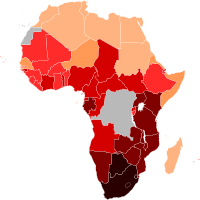
Photo from wikipedia
Background Voluntary Medical Male Circumcision (VMMC) is one of the strategies being promoted to prevent sexual heterosexual transmission of HIV. It has been adopted by 14 countries with high HIV… Click to show full abstract
Background Voluntary Medical Male Circumcision (VMMC) is one of the strategies being promoted to prevent sexual heterosexual transmission of HIV. It has been adopted by 14 countries with high HIV prevalence and low circumcision rates. The 60.0% protective efficacy of VMMC has come with misconceptions in some societies in Malawi, hence VMMC clients may opt for risky sexual practices owing to its perceived protective effect. The study estimated proportion of circumcised men engaging in risky sexual behaviors post-VMMC, assessed knowledge on VMMC protective effect and identified socio-demographic factors associated with risky sexual practices. Method A cross sectional study was conducted at two sites of Mzuzu city. Systematic random sampling was used to select 322 participants aged 18–49 who had undergone VMMC. The independent variables included age, location, occupation, religion, marital status and education. Outcome variables were non condom use, having multiple sexual partners and engaging in transactional sex. Data from questionnaires was analyzed using Pearson’s chi square test and logistic regression. Results Out of 322 respondents, 84.8% (273) understood the partial protection offered by VMMC in HIV prevention. Ninety-six percent of the participants self-reported continued use of condoms post VMMC. Overall 23.7–38.3% participants self-reported engaging in risky sexual practices post VMMC, 23.7% (76) had more than one sexual partner; 29.2% (94) paid for sex while 39.9% ( n = 187) did not use a condom. Residing in high density areas was associated with non-condom use, ( p = 0.043). Being single ( p < 0.001), and residing in low density areas ( p = 0.004) was associated with engaging in transactional sex. Conclusion Risky sexual practices are evident among participants that have undergone VMMC. Messages on safer sexual practices and limitations of VMMC need to be emphasized to clients, especially unmarried or single and those residing in low density areas.
Journal Title: BMC Public Health
Year Published: 2020
Link to full text (if available)
Share on Social Media: Sign Up to like & get
recommendations!